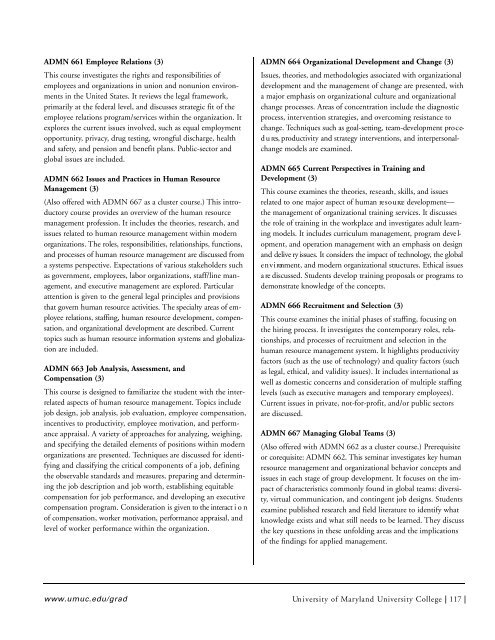A+B. Intro_SJ.1 - University of Maryland University College
A+B. Intro_SJ.1 - University of Maryland University College
A+B. Intro_SJ.1 - University of Maryland University College
You also want an ePaper? Increase the reach of your titles
YUMPU automatically turns print PDFs into web optimized ePapers that Google loves.
ADMN 661 Employee Relations (3)<br />
This course investigates the rights and responsibilities <strong>of</strong><br />
employees and organizations in union and nonunion environments<br />
in the United States. It reviews the legal framework,<br />
primarily at the federal level, and discusses strategic fit <strong>of</strong> the<br />
employee relations program/services within the organization. It<br />
explores the current issues involved, such as equal employment<br />
opportunity, privacy, drug testing, wrongful discharge, health<br />
and safety, and pension and benefit plans. Public-sector and<br />
global issues are included.<br />
ADMN 662 Issues and Practices in Human Resource<br />
Management (3)<br />
(Also <strong>of</strong>fered with ADMN 667 as a cluster course.) This introductory<br />
course provides an overview <strong>of</strong> the human resource<br />
management pr<strong>of</strong>ession. It includes the theories, research, and<br />
issues related to human resource management within modern<br />
organizations. The roles, responsibilities, relationships, functions,<br />
and processes <strong>of</strong> human re s o u rce management are discussed from<br />
a systems perspective. Expectations <strong>of</strong> various stakeholders such<br />
as government, employees, labor organizations, staff/line management,<br />
and executive management are explored. Particular<br />
attention is given to the general legal principles and provisions<br />
that govern human re s o u rce activities. The specialty areas <strong>of</strong> emp<br />
l oyee relations, staffing, human re s o u rce development, compensation,<br />
and organizational development are described. Cu r re n t<br />
topics such as human re s o u rce information systems and globalization<br />
are included.<br />
ADMN 663 Job Analysis, Assessment, and<br />
Compensation (3)<br />
This course is designed to familiarize the student with the interrelated<br />
aspects <strong>of</strong> human resource management. Topics include<br />
job design, job analysis, job evaluation, employee compensation,<br />
incentives to productivity, employee motivation, and performance<br />
appraisal. A variety <strong>of</strong> approaches for analyzing, weighing,<br />
and specifying the detailed elements <strong>of</strong> positions within modern<br />
organizations are presented. Techniques are discussed for identifying<br />
and classifying the critical components <strong>of</strong> a job, defining<br />
the observable standards and measures, preparing and determining<br />
the job description and job worth, establishing equitable<br />
compensation for job performance, and developing an executive<br />
compensation program. Consideration is given to the interact i o n<br />
<strong>of</strong> compensation, worker motivation, performance appraisal, and<br />
level <strong>of</strong> worker performance within the organization.<br />
ADMN 664 Organizational Development and Change (3)<br />
Issues, theories, and methodologies associated with organizational<br />
development and the management <strong>of</strong> change are presented, with<br />
a major emphasis on organizational culture and organizational<br />
change processes. Areas <strong>of</strong> concentration include the diagnostic<br />
process, intervention strategies, and overcoming resistance to<br />
change. Techniques such as goal-setting, team-development pro c e-<br />
d u res, productivity and strategy interventions, and interpersonalchange<br />
models are examined.<br />
ADMN 665 Current Perspectives in Training and<br />
Development (3)<br />
This course examines the theories, re s e a rch, skills, and issues<br />
related to one major aspect <strong>of</strong> human re s o u rce deve l o p m e n t —<br />
the management <strong>of</strong> organizational training services. It discusses<br />
the role <strong>of</strong> training in the workplace and investigates adult learning<br />
models. It includes curriculum management, program deve l-<br />
opment, and operation management with an emphasis on design<br />
and delive ry issues. It considers the impact <strong>of</strong> technology, the global<br />
e n v i ronment, and modern organizational stru c t u res. Ethical i s s u e s<br />
a re discussed. Students develop training proposals or programs to<br />
demonstrate knowledge <strong>of</strong> the concepts.<br />
ADMN 666 Recruitment and Selection (3)<br />
This course examines the initial phases <strong>of</strong> staffing, focusing on<br />
the hiring process. It investigates the contemporary roles, relationships,<br />
and processes <strong>of</strong> recruitment and selection in the<br />
human resource management system. It highlights productivity<br />
factors (such as the use <strong>of</strong> technology) and quality factors (such<br />
as legal, ethical, and validity issues). It includes international as<br />
well as domestic concerns and consideration <strong>of</strong> multiple staffing<br />
levels (such as executive managers and temporary employees).<br />
Current issues in private, not-for-pr<strong>of</strong>it, and/or public sectors<br />
are discussed.<br />
ADMN 667 Managing Global Teams (3)<br />
(Also <strong>of</strong>fered with ADMN 662 as a cluster course.) Prerequisite<br />
or corequisite: ADMN 662. This seminar investigates key human<br />
resource management and organizational behavior concepts and<br />
issues in each stage <strong>of</strong> group development. It focuses on the impact<br />
<strong>of</strong> characteristics commonly found in global teams: diversity,<br />
virtual communication, and contingent job designs. Students<br />
examine published research and field literature to identify what<br />
knowledge exists and what still needs to be learned. They discuss<br />
the key questions in these unfolding areas and the implications<br />
<strong>of</strong> the findings for applied management.<br />
w w w. u m u c . e d u / g r a d<br />
Un i versity <strong>of</strong> Ma r yland Un i versity <strong>College</strong> | 117 |

















